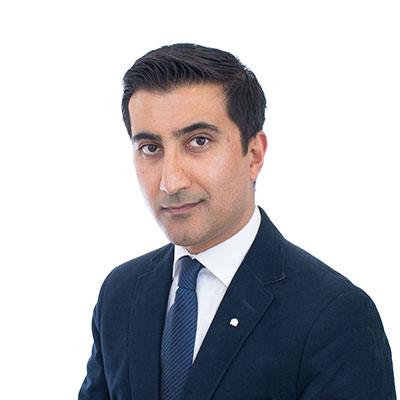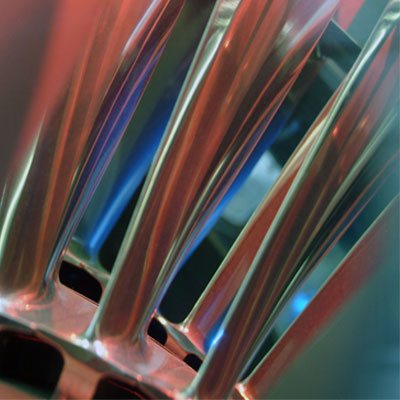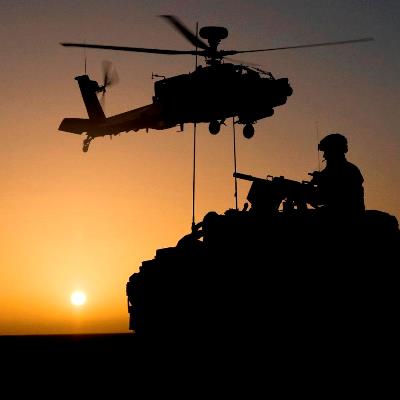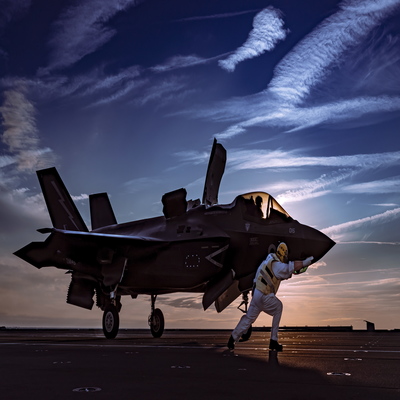Overview
- Start dateSeptember
- DurationMSc: up to three years part-time; PgDip: up to two years part-time; PgCert: up to two years part-time
- DeliveryA mixture of lectures, laboratory demonstrations, tutorials, essays, examinations, individual and group design exercises. In addition, for MSc students a written dissertation research project and viva voce examination
- QualificationMSc, PgDip, PgCert
- Study typePart-time
- CampusCranfield campus, Cranfield University at Shrivenham
Who is it for?
The course draws students from the UK and Western Europe, giving an eclectic mix to the classroom environment. Maximum number of places: 25 per year.
The course structure allows students to continue in full-time employment whilst they are studying.
Why this course?
Today’s military aviation platforms are complex systems and it is essential, therefore, that they are deployed and maintained in such a way as to ensure their continued airworthiness and the safety of the crew operating them. Achieving this requires engineers to be cognisant of a broad range of aerospace engineering, airworthiness and safety disciplines.
The MSc distinguishes itself from similar courses offered by leading UK universities by offering one focused specifically on the military context, and offers unique subject areas unavailable elsewhere. You will be taught by staff, primarily from Cranfield Defence and Security and the School of Aerospace, Transport and Manufacturing, many of them world leaders in their field. Visiting lecturers also include experts from industry, research establishments and the MoD.
Course details
The course is delivered on a part-time basis and contains six compulsory modules. Students choose a further six modules plus a thesis to complete the MSc.
This provides students with the flexibility to tailor their studies to account for prior educational and work experience and the current and future needs of their employment role. The modules taken in the taught phase of the MSc (the PgDip) provide students with the knowledge and skills necessary to complete a research-based project, which forms the final part of the master's award.
Course delivery
A mixture of lectures, laboratory demonstrations, tutorials, essays, examinations, individual and group design exercises. In addition, for MSc students a written dissertation research project and viva voce examination
Individual project
The individual research project will focus on a topical subject area covered by the taught phase of the course. The subject of the project can be chosen to match the research needs of the sponsor and/or the interests of the individual student and students are encouraged to utilise their employment resources to place the project in context. Lecturing staff on both campuses will undertake supervision of research projects.
Modules
Keeping our courses up-to-date and current requires constant innovation and change. The modules we offer reflect the needs of business and industry and the research interests of our staff and, as a result, may change or be withdrawn due to research developments, legislation changes or for a variety of other reasons. Changes may also be designed to improve the student learning experience or to respond to feedback from students, external examiners, accreditation bodies and industrial advisory panels.
To give you a taster, we have listed the compulsory and elective (where applicable) modules which are currently affiliated with this course. All modules are indicative only, and may be subject to change for your year of entry.
Course modules
Compulsory modules
All the modules in the following list need to be taken as part of this course.
Airworthiness of Military Aircraft
| Aim |
|
|---|---|
| Syllabus |
|
| Intended learning outcomes |
On successful completion of the module you will be able to:
|
Aviation Safety Management
| Aim |
To provide you with the fundamental skills required to manage operational safety within the aviation industry. |
|---|---|
| Syllabus |
|
| Intended learning outcomes |
On successful completion of this module you will be able to:
|
Fixed-Wing Aeromechanics
| Aim |
To provide you with an understanding of the principles, concepts and analysis techniques of fixed-wing platforms. |
|---|---|
| Syllabus |
|
| Intended learning outcomes |
On successful completion of this module you will be able to:
|
Military Aircraft Systems
| Aim |
To provide you with an understanding of the fundamental concepts of military aircraft systems. |
|---|---|
| Syllabus |
|
| Intended learning outcomes |
On successful completion of this module you will be able to:
|
Propulsion Systems
| Aim |
To provide you with an understanding of the design and performance of aviation propulsion systems for fixed-wing, rotary-wing and UAV applications. |
|---|---|
| Syllabus |
|
| Intended learning outcomes |
On successful completion of this module you will be able to:
|
Safety Assessment of Aircraft Systems
| Aim |
To familiarise you with the various approaches to the problems of assessing the safety of increasingly complex aircraft systems. |
|---|---|
| Syllabus |
|
| Intended learning outcomes |
On successful completion of this module you will be able to:
|
Study Skills (non-assessed)
| Aim |
To provide you with the knowledge and skills necessary to research topics relating to the course and prepare written work for assessment. |
|---|---|
| Syllabus |
|
| Intended learning outcomes |
On successful completion of this module you will be able to:
|
Elective modules
A number of the modules from the following list needs to be taken as part of this course.
Aircraft Accident Investigation and Response
| Aim |
|
|---|---|
| Syllabus |
|
| Intended learning outcomes |
On successful completion of this module you will be able to:
Please note the Aircraft Accident Investigation and Response module is subject to additional costs for travel and accommodation. |
Aircraft Fatigue and Damage Tolerance
| Aim |
To familiarise students with fatigue and damage tolerance analysis techniques and their application to aircraft structural design by instruction, investigation and example. |
|---|---|
| Syllabus |
BASIC PRINCIPLES: Introduction to Fatigue Design Philosophies. Outline of the fatigue failure process; Approaches to design against fatigue; safe-life, failsafe, and damage tolerance; Fatigue life calculation requirements APPLICATIONS |
| Intended learning outcomes |
On successful completion of the module a student will be able to:
|
Aircraft Survivability
| Aim |
The course will provide engineers with knowledge of the threat environment and vulnerabilities of aircraft systems, structures and payloads. It will then introduce the design strategies and technology used to counter such threats. |
|---|---|
| Syllabus |
|
| Intended learning outcomes |
On successful completion of this module you will be able to:
|
Aviation Maintenance Operations
| Aim |
|
|---|---|
| Syllabus |
|
| Intended learning outcomes |
On successful completion of this module you will be able to:
|
Design Durability and Integrity of Composite Aircraft Structures
| Aim |
The course seeks to provide engineers with knowledge of polymer composite properties and behaviour relevant to their in-service performance durability and maintenance in aircraft structures |
|---|---|
| Syllabus |
Introduction to composite materials comparison of relevant mechanical and service properties to those of metals; manufacturing process and relation of process and constituents to service performance. Regulatory background Requirements for fatigue and damage tolerant design in civil and military aircraft as implemented for polymer composite structures. Requirements for rotorcraft and for large fixed wing aircraft. Structural analysis Brief summary of methods and techniques for stress analysis and aircraft design using polymer composite materials. Fatigue analysis In-plane fatigue and failure processes; stiffness and strength changes under fatigue loading; fatigue notch effects in polymer composite laminates; cycle counting techniques and variable amplitude loading in metallic and polymer composite materials; life assessment and calculation procedures for design against in-plane fatigue. Delamination crack growth and fracture mechanics Basic theory of linear elastic fracture mechanics; strain energy release rate; applications to delamination crack growth in polymer composite laminates; delamination crack growth testing under static and fatigue loading; laboratory testing to measure Mode I and Mode II interlaminar fracture toughness (GIC and GIIC); comparison with stress intensity approaches in metallic materials; calculation of delamination behaviour of small samples and of aircraft structures. Damage tolerance issues in composites. Service degradation processes Impact damage in polymer composite laminates Response of polymer composites to out-of-plane impact loading; laboratory testing, effects of velocity, mass and impacting body shape on damage produced; damage morphologies, barely visible impact damage (BVID) concepts; effects of laminate constituents on damage resistance; effects of in-plane loading on impact damage growth and laminate strength; compression and fatigue after impact; design against impact damage. Service environment issues Including response to temperature and humidity; bird strike; in- service damage detection in composite structures; repairs; operator experience with polymer composite aircraft structures. Structural test requirements to prove airworthiness. |
| Intended learning outcomes |
On successful completion of this module a student should be able to:
|
Fundamentals of Aircraft Engine Control
| Module Leader |
|
|---|---|
| Aim |
This course aims to give an introduction to aircraft engine control issues and systems. |
| Syllabus |
|
| Intended learning outcomes |
On successful completion of the module the student will be able to:
|
Guided Weapons
| Module Leader |
|
|---|---|
| Aim |
The aim of this module is to: provide a general overview of guided weapon systems and technology; introduce students to the theoretical design of guided weapon subsystems; demonstrate how these subsystems form the overall guided weapon system. |
| Syllabus |
• missile and the system; constituent parts of the missile and how they integrate into the complete system; the threat and how it can be countered, • airframe materials and structures; factors affecting aerodynamic lift and drag, • polar, Cartesian and roll control; aerodynamic and thrust vector control; actuation systems; instrumentation; accelerometers; rate and position gyroscopes; acceleration and velocity control; roll rate and position, latex and altitude autopilots, • principles of millimetric wave (mmW) seekers, • principles of infra-red seeker technology, • the need for guidance; types of trajectory; system characteristics and classification; command, homing and navigational guidance coverage diagrams, • reaction to thrust, propellants, jet propulsion, rocket and air-breathing engines, • principles of homing and surveillance radar, • overview of warheads for guided weapons for attack of armour, airborne targets and ground installations; safety and arming; types of fuze, matching and countermeasures. |
| Intended learning outcomes |
On successful completion of the module the student will be able to: • describe the elements that make up a guided weapon system, • discuss the principles involved and the design constraints on guided weapon airframe, propulsion, warhead, control and guidance systems and how these subsystems interact with one another, • explain the principles of radar, IR and mmW technology and how these technologies are used in guided weapon systems, • develop a preliminary guided weapon design. |
Human Factors in Aircraft Maintenance
| Aim |
The aim is to provide a broad overview of the nature and management of human error in the aviation maintenance domain. |
|---|---|
| Syllabus |
|
| Intended learning outcomes |
On successful completion of the module the student will be able to:
|
Introduction to Aircraft Structural Crashworthiness
| Aim |
|
|---|---|
| Syllabus |
- Objectives and Approach.
- Regulations. - Human Tolerance. • Crash Energy Management.
• Structural Collapse. - Collapse of metallic and composite structural components. - Component collapse vs. structural collapse. • Introduction to methods for crash analysis. - Hand calculations. - Hybrid analysis methods. - Detailed analysis methods. • Role and capability of testing and simulation in the crashworthiness field.
|
| Intended learning outcomes |
On successful completion of this module you should be able to:
|
Military Avionics -STA Communications and Navigation
| Module Leader |
|
|---|---|
| Aim |
To provide the students with an understanding of military sensor, communication and navigation avionic systems, the electronic threat to such systems and how they may be protected. |
| Syllabus |
|
| Intended learning outcomes |
On successful completion of the module a diligent student will be able to:
|
Practical Reliability
| Module Leader |
|
|---|---|
| Aim |
To familiarise course members with the reliability analysis of data from tests and service records, and methods of evaluating system reliability as part of design. |
| Syllabus |
• outline of the various means of performing the reliability analysis of components and systems, • requirements for safety and reliability analysis as part of regulatory approval process, • analysis of failure data; o negative exponential and Weibull probability distributions, o data analysis and ranking methods, o confidence intervals, o log-normal distributions, • systems; o conventional representation o series-parallel methods, o decomposition techniques, o path and cut sets, o reliability of maintained systems, o failure mode effect and criticality analysis, o fault tree analysis, o Markov methods, • applications: o reliability prediction during project design and development, o in-service reliability and service policy development, o in-service modification evaluation. |
| Intended learning outcomes |
On successful completion of the module the student will be able to: • understand and illustrate the concepts of reliability analysis, • distinguish between the different methods for analysing the reliability of components and systems, • use the most appropriate analysis technique when presented with failure data based on component and/or system in-service information, • outline a quantitative and qualitative analysis of different component and system designs. |
Rotary-Wing Aeromechanics
| Aim |
To provide students with an understanding of the principles, concepts and analysis techniques of rotary-wing (RW) platforms. |
|---|---|
| Syllabus |
|
| Intended learning outcomes |
On successful completion of the module a diligent student will be able to:
|
Uninhabited Aircraft Systems / Remotely Piloted Aircraft Systems
| Module Leader |
|
|---|---|
| Aim |
This module focuses on the up-to-date UAV systems level technologies and Artificial Intelligence based methods for mission planning and energy-based range extenders, autopilots. Furthermore, the course covers the connectivities of airworthiness and Cyber Threat in the modern airspace. The aim is to provide you with the understanding of the fundamental concepts and challenges of UAS/RPAS with a Military Airworthiness perspective including a group interactive activity involving VR UAS flight experience. |
| Syllabus |
Overview of UAS and Military Airworthiness:
UAV/RPAS passive hard subsystems -
UAV/RPAS Active Hard Subsystems -
UAS/RPAS Soft methods -
UAS/RPAS Design and Analysis Methods -
UAS/RPAS AI Design Design Based Guidance -
UAS/RPAS applications and Airworthiness - Test cases |
| Intended learning outcomes |
On successful completion of this module you will be able to:
|
Teaching team
You will be taught by Cranfield's leading experts with capability expertise, industry knowledge and collective subject research, as well as external speakers from industry and defence. The Course Director is Professor Alistair Saddington. The teaching team includes:
Accreditation
The MSc of this course has been accredited by the Royal Aeronautical Society under licence from the UK regulator, the Engineering Council as meeting the requirements for Further Learning for registration as a Chartered Engineer. Candidates must hold a CEng accredited BEng/BSc (Hons) undergraduate first degree to comply with full CEng registration requirements.
Accreditation is a mark of assurance that the degree meets the standards set by the Engineering Council in the UK Standard for Professional Engineering Competence (UK-SPEC) An accredited degree will provide you with some or all of the underpinning knowledge, understanding and skills for eventual registration as an Incorporated (IEng) or Chartered Engineer (CEng). Some employers recruit preferentially from accredited degrees, and an accredited degree is likely to be recognised by other countries that are signatories to international accords.
Your career
The course creates opportunities to develop your career at a more senior level and in achieving Incorporated or Chartered Engineer status.
Cranfield Careers and Employability Service
Cranfield’s Career Service is dedicated to helping you meet your career aspirations. You will have access to career coaching and advice, CV development, interview practice, access to hundreds of available jobs via our Symplicity platform and opportunities to meet recruiting employers at our careers fairs. Our strong reputation and links with potential employers provide you with outstanding opportunities to secure interesting jobs and develop successful careers. Support continues after graduation and as a Cranfield alumnus, you have free life-long access to a range of career resources to help you continue your education and enhance your career.
How to apply
Click on the ‘Apply Now’ button to start your online application.
See our Application guide for information on our application process and entry requirements.



















